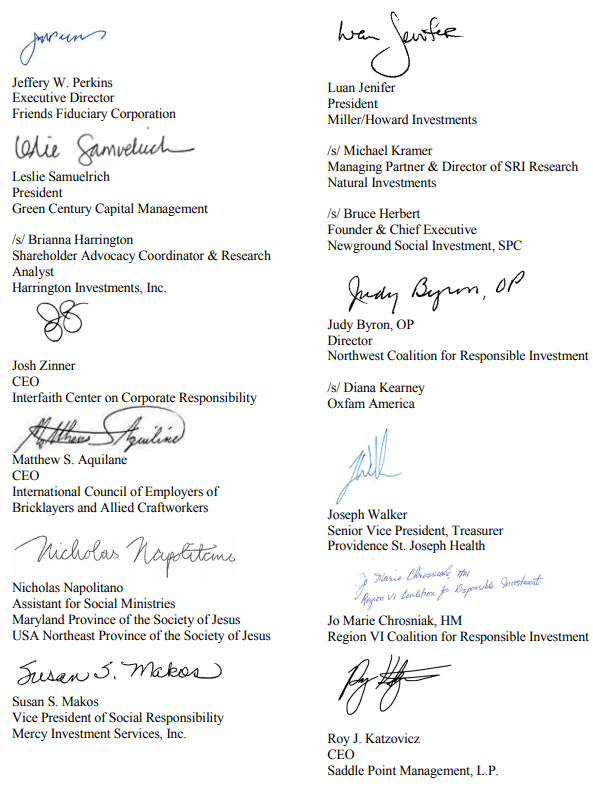Ken Bertsch is Executive Director at the Council of Institutional Investors (CII). This post is based on a comment letter that CII submitted to the United States Securities and Exchange Commission.
October 15, 2019
The Honorable Jay Clayton, Chairman
The Honorable Robert J. Jackson, Jr., Commissioner
The Honorable Allison Herren Lee, Commissioner
The Honorable Hester M. Peirce, Commissioner
The Honorable Elad L. Roisman, Commissioner
c/o Securities and Exchange Commission
100 F Street, NE
Washington, DC 20549
Re: File No. 4-725 Proxy Advisor Regulation
Dear Commissioners:
The Council of Institutional Investors and the undersigned coalition of investors writes to express concern that the Securities and Exchange Commission (the “Commission” or the “SEC”) has embarked on a series of actions that we believe may reduce investor participation in the corporate governance voting process, and is likely to undermine investor protection, upend efficiency in the critical arena of corporate governance and impair capital formation by diminishing corporate managerial accountability. We refer specifically to:
- Proxy Advisor Interpretation and Guidance. The Commission’s August 21, 2019, Interpretation and Guidance Regarding the Applicability of the Proxy Rules to Proxy Voting Advice and Guidance Regarding Proxy Voting Responsibilities of Investment Advisers (collectively, the “Proxy Advisor Interpretation and Guidance”); and
- Proxy Advisor Rulemaking. The prospect of proposed rule amendments to address proxy advisors’ reliance on the proxy solicitation exemptions in Rule 14a-2(b), which is listed in the current Commission Regulatory Flex Agenda (“Proxy Advisor Rulemaking”).
We are disappointed that the SEC did not ask for public comment on its new Proxy Advisor Interpretation and Guidance before issuance. We would ask that the SEC re-consider that interpretation and guidance, with appropriate opportunity for public comment. Should the SEC move ahead with the “Proxy Advisor Rulemaking,” we ask that you not place requirements on proxy advisors that would reduce their independence and effectiveness or reduce competition.
It is commonplace throughout our economy that firms can freely pool their resources, including through third parties, where they consider it feasible to deliver what clients routinely expect from them. Funds’ retention of advisors to help ensure that proxies are voted in a cost-effective, timely and informed manner is no exception. Proxy advisory firms provide market-based solutions, and the SEC policy initiatives have the potential to adversely affect the voluntary, uncoerced, private contracts between investors and their proxy advisors. We are concerned that the SEC approach risks replacing the current, effective free-enterprise approach with a system that defers too much to incumbent management teams and boards of directors by diminishing investor oversight and accountability mechanisms.
Market-Based Solutions to Common Proxy Voting Challenges
Institutional investors, including pension funds and other asset owners, as well as managers of mutual funds and ETFs, constitute a majority of public equity holdings. In the U.S. market in particular, these institutional holders typically vote their proxies. Individual and retail shareholders, in contrast, often decline to exercise their right to vote in respect of certain corporate actions like elections of directors, as they assume their vote will not have an impact on the outcome. Institutional investors are a market-based solution that addresses much of this problem.
Retail holders now invest much of their capital with institutional investors because they understand that institutional investors’ expertise and size bear the expectation of higher returns, lower costs and mitigated risks. Importantly, retail investors also understand that aggregating their individual holdings into larger, concentrated blocks through an institutional manager allows for more effective monitoring of company management.
Even so, institutional investors themselves face challenges in spending significant time and resources on voting decisions because the funds and other vehicles they manage receive only a portion of the benefits conveyed on all investors of the relevant enterprise.
Proxy advisors are a market-based solution to address many of these practical cost issues. Proxy advisors effectively serve as collective research providers for large numbers of institutional investors, providing these investors an affordable alternative to the high costs of individually performing the requisite analysis for literally hundreds of thousands of ballot proposals at thousands of shareholder meetings each proxy season.
Management may not agree with the proxy advisors’ recommendations that are occasionally unsupportive of management. Those recommendations are not the view of a disembodied advisor wielding power independently of its clients. Rather, proxy advisor voting recommendations are the product of many years of engagement with institutional shareholders and issuers alike. Through this process, proxy advisors have received and taken into account many viewpoints on corporate governance issues, policies and feedback received from prior and active situations. This process has ensured that proxy advisors’ recommendations reflect the views they receive from institutional investors, whose interests they serve.
Retail and institutional investors’ interests and processes will be harmed if the Commission’s new guidance and policies hamper or prevent institutional investors’ reliance on their agents, the proxy advisor firms. We believe that the Commission’s new Proxy Advisor Interpretation and Guidance is likely to create substantially increased costs and unnecessary burdens on the process by which proxy advisors render their advice. Among others, these include increased litigation, staffing and insurance costs that are almost certainly going to be passed on to institutional investors and their underlying retail clients.
No Demonstrated Need for Proxy Advisor Regulations
We are further concerned that the Commission has predicated its Proxy Advisor Interpretation and Guidance and forthcoming Proxy Advisor Rulemaking on the claim of factual inaccuracies in proxy advisors’ reports. The case for government intervention into these private market activities has not yet been made. The paucity of evidence of systematic factual errors by proxy advisors suggests that, in fact, the opposite is true. Moreover, proxy advisors maintain an open-door policy to those companies that believe the proxy advisor’s report contains factual errors. Proxy advisors routinely issue updates to their reports to correct their factual content when merited. Proxy advisors’ business model depends on factual accuracy and their incentives are thus aligned with issuers and institutional investors alike. The experience of the investor community with proxy advisors has developed over decades and has been positive. There is no current call from the investment community for regulatory intrusion on proxy advisors’ business.
Issuers, however, have called into question proxy advisory firms as their recommendations hold management teams and boards to a higher degree of accountability than they were historically accustomed. The vast bulk of issuers’ claims regarding errors in proxy advisors’ reports relate to proxy advisors’ analysis of executive compensation, a matter of personal importance to incumbent managers. Issuers contest with many parts of this process. For example, as part of the compensation process, proxy advisors select a comparative peer group. Many times, this peer group differs from the one an issuer has disclosed in its proxy statement. The consequence of proxy advisors’ bespoke analyses has, on occasion, revealed that some management teams have inflated compensation relative to truly comparable peers.
Separately, proxy advisors apply more rigorous compensation calculation models that, at times, reveal higher executive compensation amounts than those disclosed by issuers themselves. This also sometimes includes evaluating how and whether executive compensation policies reward performance. To be clear, the differences between an issuer’s analysis and those of proxy advisors are rarely due to factual errors, but rather differences in analytical approaches and opinion. Some issuers’ disdain for proxy advisors and proxy advisors’ efficacy in helping investors hold management teams accountable is not a legitimate basis on which to justify regulatory intrusion on the voluntary, uncoerced, private contractual relationship between investors and the proxy advisors.
Hampering Rule 14a-8 and Corporate Governance Reforms
Issuers and their paid advisors have been lobbying the Commission for years to adopt regulatory policies designed to hamper proxy advisors because they view proxy advisors as the “engine” behind successful 14a-8 campaigns to reform corporate governance and investors’ attempts to restrain excessive or ill-designed executive compensation. One can agree or disagree with the merits of proxy advisor analyses or voting recommendations on these issues, but there is no doubt that the underlying proxy advisor policies aim to reflect the consensus view of their clients – the institutional investors who retain proxy advisors as their agents to facilitate those institutions’ active participation in proxy voting consistent with approved voting guidelines and in discharge of their fiduciary duties to their clients, retail investors.
Intrusion on Proxy Advisor/Client Relationship
We are concerned that the Proxy Advisor Rulemaking may contemplate a direct requirement that proxy advisors share advance copies of their recommendations with issuers. Proxy advisors are agents of institutional investors, not of issuers. There is no evidence that the bulk of institutional investors believe a mandatory requirement of prior review by issuers of the work product of their agents, the proxy advisors, would be desirable or helpful to the proxy voting process. Indeed, it is abundantly clear that institutional investors, the principals in the relationship, fervently desire that the proxy advisors be wholly independent of issuers and that their reports and recommendations not be subject to prior review or influence by issuers.
In this context, it is hard to understand how protection of investors (however defined) warrants imposing on proxy advisors, and indirectly on their principals which are fiduciaries for investors, a form of prior review and comment by issuers. The impact of issuer involvement in other areas of deep concern to investors such as equity research or rating agencies has been substantial and often very negative. We see no wisdom in importing the conflicts of interest that are obvious and apparent in those contexts into the relationship between investors and proxy advisors. In our view, any Commission regulation intruding on the independence of proxy advisors and their agency relationship to institutional investors would be a profound change in the Commission’s regulatory policy, without any foundation in the Commission’s historic role of investor protection, and would severely jeopardize the interests of investors, individual and institutional, in a fair and fully-functioning proxy voting system.
Sincerely,
 Print
Print



